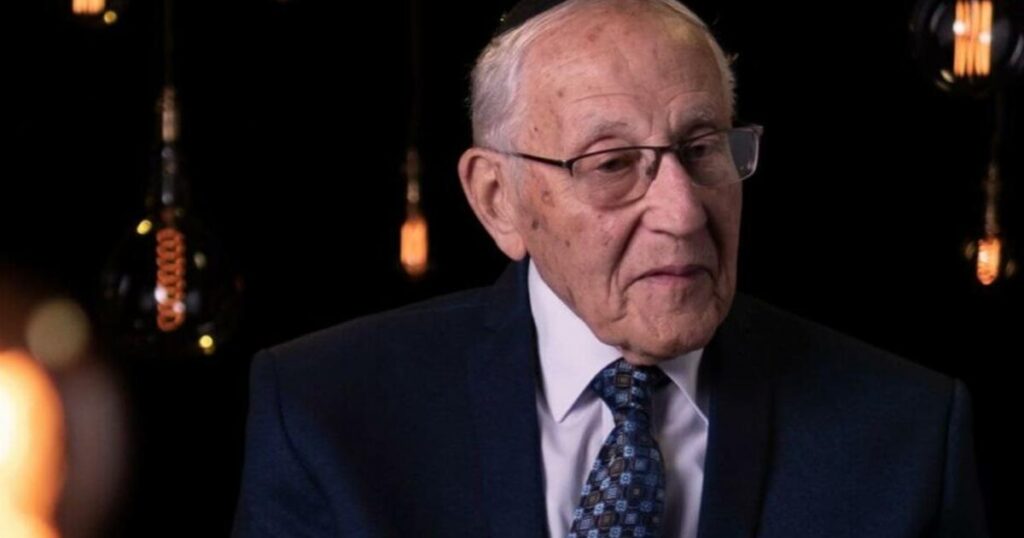He was liberated from a Nazi concentration camp by British troops in 1945 when he was 15 and arrived in London as a refugee after the war and settling in Hendon.
He went on to be an educator about the Holocaust, committed to teaching future generations of the dangers of genocide and antisemitism.
He had his portrait commissioned by King Charles when he was still Prince of Wales, and spoke to the King about the monarch’s forthcoming trip to Auschwitz when they met at a Buckingham Palace Holocaust Memorial Day reception in January.

Manfred was made an MBE by the King in June for his work through the Holocaust Educational Trust.
“Manfred’s passing leaves a void in our community,” the trust’s chief executive Karen Pollock said.
“He endured unimaginable horror and loss — but chose to look forward and dedicate his life to making sure the atrocities would never be forgotten and antisemitism in all its guises would be confronted.
“Manfred could never have imagined as a 15-year-old rescued by the British Army in 1945 that he would one day stand shoulder to shoulder with the Royal Family, with prime ministers, ambassadors and MPs, sharing the story of what happened to him and the Jews of Europe.”

Manfred Goldberg was born in Germany in 1930 to an Orthodox Jewish family in Kessel, his early life marred by Nazi persecution.
His mother managed to get a single visa for his father to emigrate to Britain in 1939 — but the outbreak of war just days later meant the rest of the family were trapped and could not follow.

They were deported to the Riga ghetto in Latvia, subjected to starvation, forced labour and brutality, before being transferred with other displaced Jews in cattle trucks to a labour camp where he saw his nine-year-old brother Hermann for the last time — never discovering his fate.
Manfred and his mother were later transported to a concentration camp in Occupied Poland for forced labour, where he witnessed people left to die in their bunk beds from starvation and malnutrition.
They were forced onto one of the infamous death marches in 1945 just days before Germany’s surrender, but was then liberated by British tanks in Neustadt on May 3 — and finally reunited with his father Baruch Goldberg in London.

Manfred filled in the missing years of his education and went on to graduate from the University of London with an electronics degree. He married Shary in 1961 and raised four sons, later adding several grandchildren and a great-grandchild.
He once said: “My revenge on the Nazis is building our lovely family.”
Manfred became a Holocaust educator later in life, and committed his memories and thoughts to a virtual reality version of himself filmed from his responses to hundreds of questions.
Tribute was paid to Manfred this week by the Association of Jewish Refugees, which said: “His life is testament to resilience, hope and the power of memory, with his lifelong commitment to remembrance and education.”
Rabbi Naftali Schiff, founder of the JRoots Holocaust education charity, produced a documentary with Manfred about his experience.
He said: “Manfred Goldberg was a proud Jew with the most steadfast belief, with gratitude for his lot in this world, who chose goodness, decency, kindness and faith over bitterness and despair. He was upright, with decent behaviour towards every human being.”

Olivia Marks-Woldman, chief executive of the Holocaust Memorial Day Trust, also paid tribute to Manfred, saying: “He was committed to sharing his experiences to reach hundreds of thousands of people. His legacy continues to inspire us for years to come.”
The Association of Jewish Refugees described Manfred as “a remarkable survivor, educator and advocate for remembrance”.
It recorded his experiences in a collection of ‘Refugee Voices’ to stand witness to the Nazi Holocaust, in which a third of the world’s Jewish population were murdered — men, women, children and even babies — in the worst genocide in human history.




